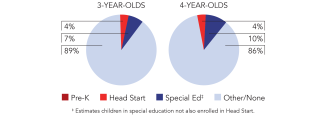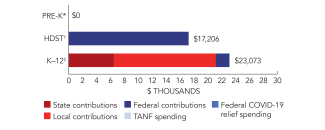
State of Preschool
New Hampshire
No Program
New Hampshire’s approach to early childhood education is rooted in local control and flexibility, allowing communities to design preschool programs that best meet their needs. Rather than a state funded universal pre-K system, New Hampshire supports a diverse mixed delivery model that includes public school programs, private early learning providers, Head Start, Early Head Start, community- based partnerships, family childcare, and group family childcare. This decentralized approach enables school districts and communities to leverage multiple funding sources, including Title I, IDEA Part B, local taxpayer supported initiatives, and tuition-based models, ensuring that families have a variety of preschool options to choose from. The New Hampshire Department of Health and Human Services (DHHS) plays a key role in licensing early childhood programs and administering preschool scholarships through childcare assistance programs for low-income families. Meanwhile, the New Hampshire Department of Education (NHED) oversees early childhood special education programming, ensuring that preschool services align with federal IDEA Part B requirements while allowing local districts to expand access beyond special education services.
In the 2023 -2024 school year, 144 public school preschool programs were identified, serving approximately 5,067 children (about 20% of the state’s 3- and 4-year-olds). While IDEA Part B funding ensures that preschool is available for children with identified disabilities, 129 of these programs also serve children without an IEP, demonstrating the state’s commitment to expanding access through multiple pathways. Many districts have found creative solutions to increase preschool availability, including tuition-based models, public- private partnerships, and voter-approved local funding. This flexibility allows communities to offer part-day, full-day and five day per week options, with 38% of programs providing five-day preschool and 15% offering full day programming. While availability varies by district, the state’s local control approach gives communities the ability to tailor early childhood education offerings to best fit family needs and local resources. As New Hampshire continues to strengthen its early learning system, NHED remains committed to supporting districts, expanding funding strategies, and ensuring that families have access to a variety of high-quality preschool options that reflect New Hampshire’s values of local governance and family choice.
New Hampshire
Access

| |
| Total state pre-K enrollment | 0 |
| School districts that offer state program | NA |
| Income requirement | NA |
| Minimum hours of operation | NA |
| Operating schedule | NA |
| Special education enrollment, ages 3 and 4 | 2,398 |
| Federally funded Head Start enrollment, ages 3 and 4 | 1,023 |
| State-funded Head Start enrollment, ages 3 and 4 | Not reported |
Resources
| Total state pre-K spending | $0 |
| Local match required? | NA |
| State Head Start spending | Not reported |
| State spending per child enrolled | $0 |
| All reported spending per child enrolled* | $0 |

*Pre-K programs may receive additional funds from federal or local sources that are not included in this figure. †Head Start per-child spending includes funding only for 3- and 4-year-olds. ‡K–12 expenditures include capital spending as well as current operating expenditures.